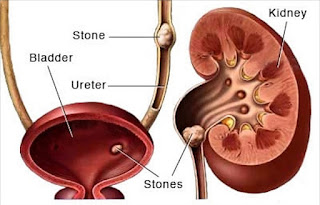Kidney stones
(renal calculi)
 |
| Kidney stones (renal calculi) |
Renal calculi, also known as kidney stones, are hard masses made up of crystals that form in the kidneys. These stones can range in size from a grain of sand to the size of a golf ball, and they can cause severe pain as they move through the urinary tract.
Kidney stones are formed when there is an imbalance of certain substances in the urine, such as calcium, oxalate, and uric acid. These substances can form crystals, which can then grow into larger stones. Risk factors for kidney stones include a family history of the condition, certain medical conditions such as gout or inflammatory bowel disease, and a diet high in salt, sugar, and animal protein.
Symptoms of kidney stones may include severe pain in the back, abdomen, or groin, as well as blood in the urine, nausea, and vomiting. These symptoms can be intense and may require medical attention.
Diagnosis of kidney stones is typically done through a combination of imaging tests, such as a CT scan or ultrasound, and a physical examination. Once the stones have been diagnosed, treatment may involve medications to help dissolve the stones or procedures to remove the stones. In some cases, the stones may pass on their own with the help of pain medication and increased fluid intake.
Preventing kidney stones involves maintaining a healthy diet and lifestyle. This includes drinking plenty of water to help flush out the kidneys, limiting intake of salt, sugar, and animal protein, and getting enough calcium and other essential nutrients. It is also important to manage any medical conditions that may increase the risk of kidney stones, such as gout or inflammatory bowel disease.
Kidney stones can be a painful and debilitating condition, but with proper treatment and prevention, they can be managed. If you are experiencing symptoms of kidney stones, it is important to speak with your doctor to determine the best course of treatment.
3 Comments
Superb...
ReplyDeleteMashaallah
ReplyDeleteExcellent
ReplyDeletePost a Comment